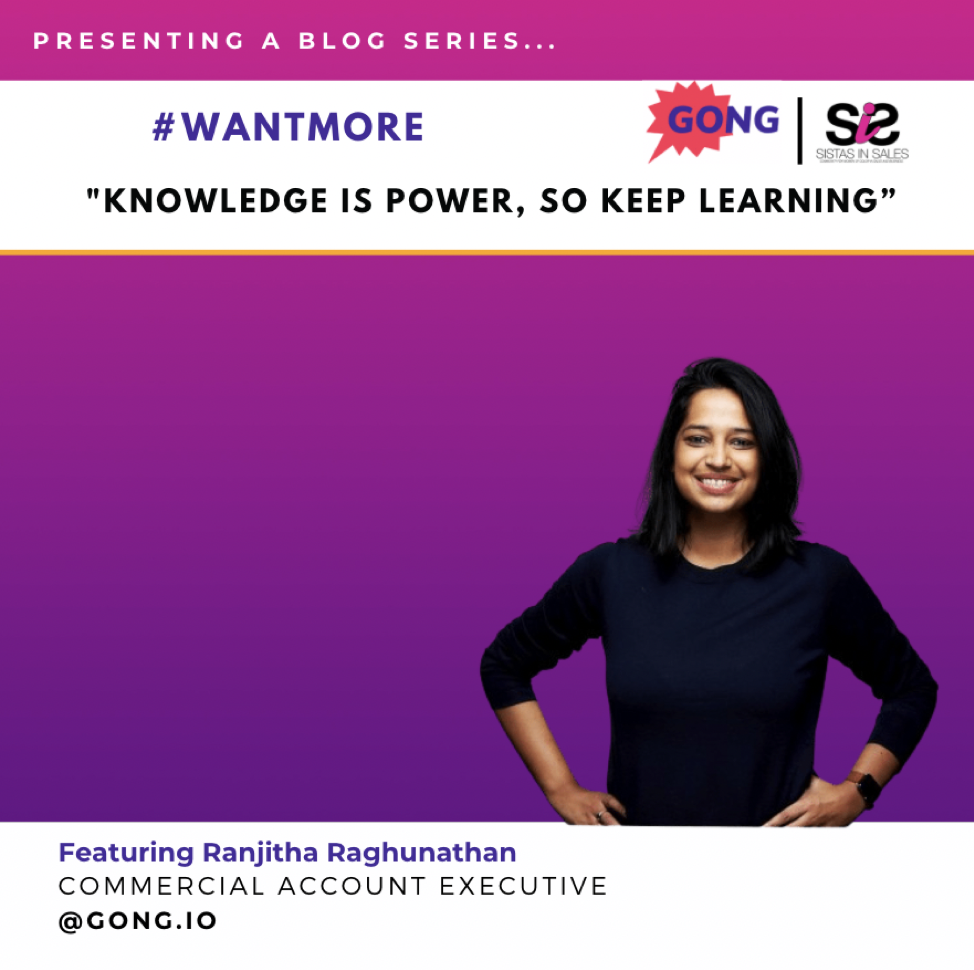#WantMore: Knowledge Is Power, So Keep Learning

Meet Ranjitha Raghunathan, Commercial Account Executive at GongInterviewed by Florence Madenga “Find your own personal board of directors” On The Pandemic For many people, a global pandemic may look like the worst time to be starting a new job at a new company. For Ranjitha Raghunathan, her first two months at Gong have encompassed some of the best teamwork she’s experienced in a workspace, even without the “space.” At a time where professional relationships are being tested, Ranjitha is thriving. “Obviously we have all been remote and I haven’t met many of them personally,” she says of her team and colleagues. But “they’ve been super helpful. And I think Gong as a tool and a platform itself actually helps me become a better salesperson every day. I couldn’t be happier.” As a commercial account executive, Ranjitha works with smaller companies — this means the size is anything from one employee to 250. The “small and mid-sized business” (SMB) space requires a lot of cold calling, identifying exciting business prospects, and building relationships. It means understanding priorities, fit, and roles — the ones people say they hold, as well as the unspoken concerns, values and responsibilities. While much of this comes naturally to Ranjitha, what made her career transition so painless is that within the first month in her role, she participated in Gong’s mentorship program, which encourages employees to “reach out to anyone to get some help.” She did just that. Ranjitha found herself “leaning a lot on teammates and colleagues” that have quickly turned into friends. She describes this culture as “feedback forward,” a part of the #NoSugar Operating Principle, which fosters an environment where everyone can improve daily and own their own way of selling. Employees are encouraged to be direct, speak their mind, and expect the same from their peers. On Trying Again Ranjitha’s journey to Gong has been two years coming. The first time she applied for a position there, she did not get the job. “I was not qualified by any means to get that job,” she says. But that didn’t mean she stopped. She honed her skills at Salesforce as a new business account executive, and then an SBE account executive, where she consistently outperformed expectations and was a peer-elected team lead. Meanwhile, before she applied a second time at Gong, she combed through much of the content the company was generating, from podcasts and YouTube Video content, to reading more about the industry. “So when they reached out to me, it was a fangirl moment, really,” she says. She breezed through the interview process and found herself at Gong, now as a commercial account executive. Like her arrival to Gong, Rajintha’s arrival to sales has not been linear. It has culminated in journeys across the Atlantic, and interests that she’s gleaned at several other moments in her life. Seven years ago, she moved to the U.S. from India. Prior to that, she was a software engineer, and quickly realized engineering was not something she was passionate about. She then worked for a small wind energy startup where she got into sales, business development, and realized: “Well, it’s like I’ve been doing sales all my life and I just had no idea.” Additionally: “I firmly believe that you don’t technically need to have a title to be in sales,” she says. “I was always selling. You just don’t know what you’re selling, or you could be selling yourself every day.” On Not Selling Out But how do you “sell yourself” without…well, selling yourself? On applying to a sales job (which can be meta because the process itself is an exercise in sales), Ranjitha recommends sticking to who you are. “I think specifically for women of color, it’s important that you own it,” she says “If you’re going to be different, you’re going to sound different. You’re going to look different. And that’s what brings your unique perspective to your job. That’s what makes you stand out and really hone in on those skills.” Here, Ranjitha is speaking from experience. As a brown woman in sales, she has been asked to “tone it down,” to “not be so direct,” so “soften the blow” and adhere to more stereotypical feminized and racialized modes of behavior in the workspace. “I was never a fan of that because that’s not who I am,” she says. “If I was going to take so long to write an email, she says, as has been recommended by some to “tone down” her approach, “the email I’m sending out is really not something I would even say.” So instead of finding another voice, Ranjitha would rather spend time finding her own. “The minute you start imitating someone else, you are going to forget it, you’re going to hate it, and nobody wants that,” she says. “And just to think, you know, the challenges that come with being a woman in sales and in such a male dominated field is a job by itself.” It is because of this reason, and the notion that sales as a career can be “super controlled,” that well-intentioned close friends and family, knowing her personality, warned her not to enter sales. She knew things like “having an accent” and coming from a different country would mean dealing with prejudice. Dealing with this has required having more open and honest conversations around diversity and inclusion. “People don’t realize that we’re not stupid,” Ranjitha says. “Someone says, ‘hey, don’t be in sales.’ Literally, the first question that comes to mind is ‘Why? Do you think I sound different?’ That’s my first question. It’s unfortunate that it’s common, but I think thankfully that times are changing.” On Finding Your Own Personal Board of Directors What has also helped that change is other women supporting each other. “I think people who I admire the most are people who care, like they really really care, and not just say they care,” she says. “There’s a big difference between the two, and people don’t really realize that.”
#BreakIntoTechSales: Executive Leadership—The Path to the C-Suite

Angelique SlagleHead of SAP Human Experience Management Line of BusinessSAP North America I had the opportunity to interview Angelique Slagle, head of SAP SuccessFactors. Angelique is the highest-ranking Black executive at SAP and has profit and loss (P&L) responsibility. SuccessFactors is a world-leading provider of cloud human experience management, one of the fastest-growing areas in human resources. Angelique leveraged her unique skills to navigate her career from being an administrative assistant to managing a large national sales team for a solution product used by 43 percent of Fortune 500 companies, with 160 million end users in 42 languages. Q: What drew you to being a sales leader? A: I’ve always thought sales was a glamorous position. When I first went to IBM, I started out as an administrative assistant. After about a year, they moved me into a position as junior project manager and then eventually as project manager. I remember seeing these guys come into the office, and they were in their suits and drove Mercedes, and I wondered, “Who are they?” From my perspective, they just came and talked for a couple of minutes and walked out—I was the one taking all the notes and doing the work. I said to myself, “Who are these people, and how do I get on that success track?” Angelique shared that one of the keys to success as a sales executive is good decision-making. Critical Thinking Critical thinking is an essential skill, and yet, as sales professionals, we tend to accept the first proposed solution. Take time to evaluate a topic from all sides. Improving your critical thinking will pay off with improved solutions, better client relationships, and increased sales. Q: Can you tell me more about how critical thinking leads to executive presence? Women, more particularly women of color, tend to lack dominant presence in the workplace. When we walk into a room, we don’t tend to command attention, and we’re not naturally assumed to be leaders or sales executives. We really must spend more time developing the ability to read and lead a room, understanding where people are, and figuring out how to bring them with us or get them to rally behind us. I think that kind of critical thinking skill set is something we naturally have in our DNA. We need to understand the psychology of the people we’re interacting with and then assess the situation while maintaining a highly professional presence. We already do so much of that work in our daily lives- we’ve mastered it professionally far better than our male counterparts. Cultivating Executive Presence Q: You have great executive presence. I have been admiring how this shows up in everything you do. How can women sharpen their executive presence skills to become sales leaders? It starts with having a positive mindset. Executive presence means you project self-confidence, approach unpredictable and difficult situations with calm and ease, and deal with conflict rather than avoid it while looking for an opportunity for growth or to demonstrate your executive presence. To achieve this, you must believe in yourself, and the impact and value you will bring to any room, team or company. Gaining P&L Responsibility and C-Suite Access There is a clear moral argument for increased diversity in top sales management. A recent HRB article indicates companies with more women in executive roles experience many benefits, including increased profitability, improved social responsibility, and the ability to provide higher-quality customer experiences. Ursula Barnes, former CEO of Xerox, was interviewed in 2017 about the lack of Black women in the C-suite. “HR isn’t going to get you there,” said Barnes. “Communications and the arts aren’t going to get you there.” The juice lies with people who are close to the product and the money. Barnes shared a critical tip: Taking a role that has P&L responsibility is a key responsibility for executive sales leadership. Having P&L responsibility involves running a business unit. You are responsible for driving revenue and managing all expenses—maximizing revenue and minimizing expenses to make a profit. Having a seat at the C-suite table as a sales leader requires a job that directly affects the company’s bottom line. Strategies for Successful Sales Leadership Q: How can women of color get into the C-suite or run a line of business? There are three things we can do to move into sales leadership. First, develop financial fluency and an ownership mentality. Seek out roles with P&L responsibility, be an innovator, position yourself as a strong organizational change agent, challenge the industry status quo, and be an industry disruptor. Second, think strategically and create a sense of direction. Ensure every team member is invested in driving revenue growth and improving the company’s financial situation. Develop the confidence and determination to identify savings and growth opportunities and to execute your ideas. Third, embrace your uniqueness. See your worth; don’t wait until someone acknowledges it for you. Q: What’s one thing women can do to help themselves on this pathway? Find a sponsor. Be visible. Sign up for something that puts you in the limelight, like finding a stretch assignment, booking a speaking engagement, executive sponsor an Employee Resource Group. Become a mentor—find and sponsor someone in the organization who you think could benefit from your skill set. And stay in the know. In the morning, I used to listen to music while starting my day until a mentor told me to use my time more wisely. Instead of listening to music, I now listen to a podcast or audiobook. I take what I am learning from those recordings and apply them to either the business I am running or my life. Q: In hindsight, what would you do differently? I would have demanded more for myself earlier on. From a compensation perspective, I was unknowingly the lowest-paid person on my team for several years. I would have changed that. I would have demanded to have more strategic accounts. When I first started, I was told you start at the bottom of the ladder and work your way up,
